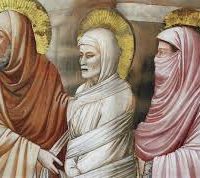Years ago, I was part of a pastoral team at a congregation in the South Bay. And in that congregation was one particular woman who adored my colleague, but just wouldn’t warm up to me. Which is kind of normal – we all have people we just don’t click with. Whenever I preached on Sundays, she would either shake my hand with a snarky remark, or not say anything.
One Sunday, I preached about today’s gospel lesson – Jesus’ words about the greatest commandment, to love God and to love your neighbor as yourself. So guess what the sermon was about? Well, love.
Now on the way out, this particular woman who didn’t like me much took a deep breath, and then said, agitated and with a frown on her face, ‘I’ve traveled the last few weeks, and I visited various churches – Episcopal, Presbyterian, you name it. And all everybody is preaching about is love, love, love. And now I hear the same old thing here.’
I couldn’t help myself but put the biggest smile on my face and respond, ‘And isn’t it wonderful that all the different denominations can agree that love is God’s greatest commandment and that it’s at the heart of our faith?’ The woman didn’t say another word and went off in a huff.
But let me tell you, this encounter left me stunned. What’s wrong with love? Well, maybe this word has been overused in our language and culture – just think about how generously we use the word ‘love’, even when we talk about things or a movie or a restaurant. No wonder some people think that love is a shallow, pie-in-the-sky kind of thing, something that is random and fleeting.
But love as it is used in the Bible – love as it us used by Jesus – is not a feeling that comes and goes on a whim.
The context of today’s gospel alone makes this very clear. Today’s gospel takes place in the temple of Jerusalem, just a couple of days before Jesus’ arrest, torture, and execution. Just one day before today’s gospel takes place, Jesus triumphantly enters Jerusalem on a donkey, as people are shouting ‘hosanna.’ Jesus then immediately goes to the temple, his enthusiastic followers in tow – and starts a riot, as he drives out the moneychangers and the merchants. He’s deliberately stirring up the order. In a sense, he’s throwing down the gauntlet.
The very next day, he has the nerve to return to the temple to teach – and of course immediately is accosted by various leaders and members of different religious groups: priests, elders, Pharisees, Sadducees, people from Herod’s court. People who represent law and order in Jerusalem. Jesus already disturbed the order – now they start grilling him on matters of the law.
But first they ask: By what authority do you do all these things? Who are you to do all these things?
Jesus doesn’t answer this question directly. Instead, he starts teaching and talking in parables about the kingdom of God, a realm of grace to which everyone is invited. But he is interrupted again and again by contingencies of temple authorities and rabbis: what do you think about this? What do you say about that? Is it lawful to pay taxes to Caesar? What do you think about life after death (that was of importance to the Sadducees, who didn’t believe in the resurrection of the dead)? What is the greatest commandment? – What do you stand for? What’s your plan? Why should be follow you? Why should we trust you? Who are you?
Now this kind of interrogation is nothing new to us. We are a little more than one week away from Election Day. There have been interviews, attempts to have substantial debates, town halls, political campaigns. And of course we ought to want to know from any candidates: What do you stand for? What’s your plan? Why should we follow you? Why should we trust you? Who are you?
And of course we tend to vote for that person or that proposition that seems to fit best with our values and convictions. We tend to vote for that person that doesn’t rock our world and all we hold dear too much.
Jesus leaves his interrogators puzzled – or even makes them uncomfortable. Yes, his teachings are in line with God’s Torah, God’s law of what we call the Old Testament, but in a strangely unsettling way that opens new and unexpected perspectives. And, especially in the precarious situation under the Roman occupation, anything that veers from the established order, anything that threatens to disturb the delicate balance of power in Jerusalem, is seen as dangerous – even if it doesn’t contradict God’s law.
The longer Jesus teaches and responds to questions in the temple, the more the walls are closing in on him. And as the pressure mounts, he is asked: what commandment is the greatest? What law is the most important to be followed? Tell us, Jesus!
And as he is surrounded by people who, as it becomes increasingly clear, don’t trust him, who seek to find lawlessness in him, Jesus speaks of – love. Love God. Love your neighbor as yourself. On these two commandments hang all the law and prophets. Or, in other words: love – regard and respect for God and every neighbor – is at the heart of all of God’s rules and laws. If we truly obeyed God’s commandment to love, we didn’t need all the other rules – because love causes us to look out, primarily not for ourselves, but for our neighbor.
And in a perfect world, I wouldn’t really have to look out for myself, because there would be always others to look out for me as well.
The love Jesus talks about is not a shallow, a superficial and fleeting feeling that comes and goes, a pie-in-the-sky sensation; no, the love Jesus talks about takes effort – great effort. It is about a general attitude. It is about commitment. It is about swallowing our pride. It is about forgiveness and reconciliation. It is about sacrificing our unbridled freedom so that someone else may have freedom as well. The love Jesus talks about is tough, it doesn’t come easy. And that’s probably why it is the greatest commandment. Love God. Love your neighbor as yourself.
Jesus reveals in these words who he is: the Son of God, who seeks to reconcile with humanity, which more often than not goes astray. The Son of God, who is willing to bring sacrifices for the sake of the world God so loves. Trust me, Jesus implores. Believe me. Follow in my footsteps. But this radical love is just too hard and too scary for many. Spoiler alert: a couple of days after Jesus talks about love, he is nailed to the cross. Which, in turn, becomes the symbol for the greatest love imaginable.
Love – the love Jesus talks about – doesn’t come easy. We especially experience this in times like these, as we are going into a highly contested election in a country that arguably hasn’t been this divided since the Civil War. It’s not easy to love people whose values and convictions contradict mine.
But if we are committed to Christ, we also have to be committed to love – the kind of love that has the power to transform us and to transform the world. The kind of love that defines the heavenly kingdom, which has come near and yet seems to be just out of reach – a realm where all divisions shall be no more and all shall be united in true peace and justice. Love will get us there.
This post is also available in: German




